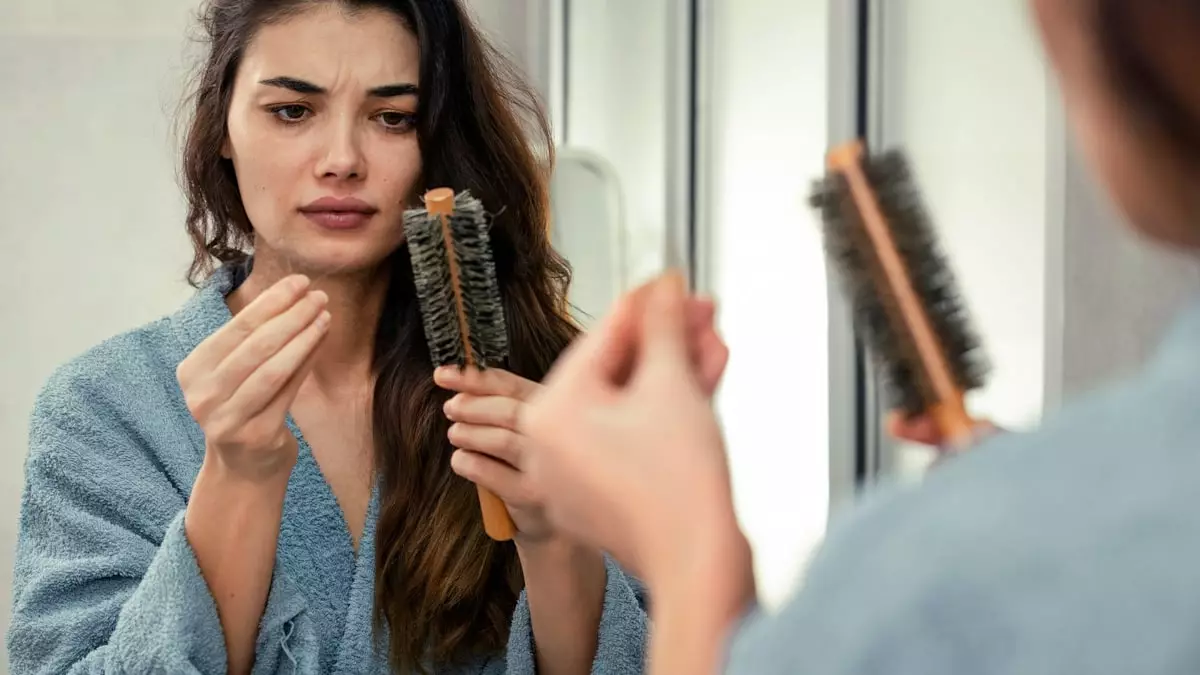As innovative weight loss medications like Mounjaro gain the spotlight for their effectiveness in managing weight and blood sugar levels, a troubling trend has emerged: an alarming rise in hair loss concerns among users. The surge in online searches regarding “Mounjaro hair” has soared by more than 250% in the last few months, underscoring a significant apprehension surrounding the medication’s impact on hair health. Social media platforms, particularly TikTok, are flooded with testimonials from individuals who have experienced noticeable thinning or shedding since starting the drug, stirring a communal atmosphere of worry and inquiry.
While it’s essential to note that not every individual using Mounjaro will experience hair loss, a considerable volume of anecdotal evidence begs for attention. The connection between rapid weight loss and hair thinning may not be direct, but it is undeniably linked through the body’s intricate stress responses and nutritional dynamics. Understanding the science behind this phenomenon is crucial for anyone considering or currently using Mounjaro, as it potentially frames their experience and approach to taking care of their tresses.
The Science Behind Hair Thinning on Mounjaro
Mounjaro functions as a GLP-1 receptor agonist, a class of medications typically prescribed for managing blood sugar and facilitating weight loss. However, the swift weight reduction commonly associated with its use can provoke a stress response in one’s body. When the body perceives weight loss as a stressor, it instinctively prioritizes essential functions for survival, inadvertently placing non-essential processes, such as hair growth, on the backburner.
More critically, users often find themselves with a suppressed appetite—an inherent feature of Mounjaro. This appetite suppression, while beneficial for weight loss, can lead to nutritional deficiencies. Important nutrients that are vital for hair health, including proteins, iron, and omega fatty acids, may be missed in a diet that lacks variety and abundance. The adverse effects of insufficient nutrition can manifest as weaker hair, increased brittleness, and, ultimately, significant shedding, particularly in women with specific hormonal challenges.
Navigating Lifestyle Changes for Hair Health
The good news is that addressing hair loss while using Mounjaro is not only possible but can also be an empowering journey. Users can take proactive steps to promote healthy hair growth and mitigate potential shedding through thoughtful dietary choices and lifestyle adjustments. Here’s how:
Ensure Sufficient Protein Intake: Hair is primarily composed of keratin, a protein. A well-rounded diet incorporating quality protein sources—eggs, lean meats, legumes, and dairy—is paramount. Regularly including these in meals can prevent hair from becoming brittle and reduce the likelihood of significant hair loss due to nutrient deficiencies.
Optimize Healthy Fats: Healthy fats are indispensable for hormonal balance and maintaining a healthy scalp. Foods rich in omega-3 and omega-6 fatty acids, such as fatty fish, avocados, and nuts, should be integral to your daily menu to nurture both scalp and hair health.
Manage Stress and Prioritize Sleep: The link between hair health and stress is well documented. Increased cortisol levels from stress can disrupt the hair growth cycle. Incorporating relaxation techniques, such as mindfulness or yoga, into your routine can mitigate stress impacts. Furthermore, adequate sleep, ideally 7-9 hours nightly, is crucial for overall recovery and balance in one’s body.
Practical Tips for Hair Care and Support
Caring for your hair also involves gentle handling and using the right products. Switching to sulfate-free shampoos and conditioners can prevent further damage, while using a wide-toothed comb can help to minimize breakage, especially when hair is wet. Making conscious lifestyle choices and protecting hair from excessive heat and styling can also help maintain hair integrity during this transformative period.
Stay Hydrated: Interestingly, Mounjaro can suppress the sensation of thirst, leading to potential dehydration, which can further complicate hair health. Maintaining hydration is essential for nourishing hair follicles. Strive to drink at least 1.5-2 liters of water each day, and consider electrolytes to enhance hydration efficiency.
Explore Collagen Benefits: Collagen plays a vital role in scalp health and hair resilience. Including foods that boost collagen production—such as bone broth, citrus fruits, and berries—can support your body’s efforts to maintain strong hair. Adding a collagen supplement might also benefit those experiencing heightened stress or aging.
Innovative Solutions for Enhanced Hair Growth
For individuals seeking more advanced support, new treatments like RF microneedling are proving efficacious. Combining radiofrequency technology with microneedling, newer options like Sylfirm X with Morphiya promote improved blood flow to the scalp, reactivating dormant follicles and boosting hair growth. By delivering nutrients directly to the hair follicle, these treatments can significantly enhance hair revitalization.
Finally, acknowledging that women face significant challenges with hair loss as well can markedly change perceptions and approaches to this issue. While historically underrepresented, the reality is that nearly 40% of women experience hair loss at some point in their lives—a narrative that demands attention and advocacy. It’s essential for women to address these concerns without hesitation and seek appropriate guidance and support as they navigate their hair health journeys amid life changes, including those brought on by medications like Mounjaro.

